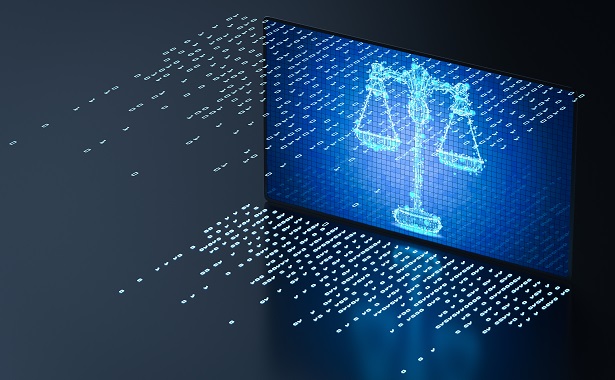How Forward-Thinking Organizations Can Leverage AI-Powered Legal Tech
In a recent Law.com article, 72% of legal leaders at U.S. organizations report they have incorporated some form of artificial intelligence into their day-to-day operations. As technology continues to evolve, how can general counsel and their staff use AI-powered legal tech to augment their work, create operational efficiencies, drive down costs and free-up time to help the business make more informed, strategic decisions?
November 30, 2022 at 05:14 PM
4 minute read

While artificial intelligence is typically used to automate manual processes, forward-thinking legal departments are discovering that AI-driven solutions can unlock a host of opportunities, including significant improvements in timelines, budgets, strategy development and business outcomes.
"The increase in remote and hybrid work during the pandemic has heightened interest in new ways technology can help modern businesses and adoption has accelerated," says Tripp Hemphill, Vice President of Enterprise Markets at DISCO.
"In addition, legal departments have come to appreciate the low-to-no barrier of entry possibly with cloud-native legal applications, that 'try then buy' is possible and welcomed by the next-gen legal tech providers" adds Hemphill. "The only true hoop to jump through is IT security approvals which, given such applications live in commercial clouds which have likely already been pre-cleared by IT sec teams, the process is streamlined to an exchange of documentation and certifications. Legal departments can quickly get their pilot projects underway, see results with their data and, armed with experience and metrics, determine if more wholesale adoption would be successful."
The essence of AI
In explaining how AI evaluates and recommends documents in the legal discovery context, Hemphill makes the analogy to facial recognition technologies.
 DISCO's Tripp Hemphill
DISCO's Tripp Hemphill "In a multi-layered process, the neural network analyzes an image – looking for attributes such as skin tone and texture or the presence of a nose, eyes and ear shape – to determine whether a human face is likely present in an image. The neural networks mimic the functions of neurons in the human brain and can be trained. AI's approach to legal documents in e-discovery works similarly in a layered process called deep learning. The technology looks first at the order and relationship between words, then converting these relationships into numbers and mapping the sequences onto a 360-degree plane. These sequences become inputs to the next stage of the deep learning process"
CNN: More than just a news channel
The sequences are put through a convolutional neural network (CNN) that predicts and makes recommendations to the legal team. Over time, the technology's understanding increases and recommendations improve as models are based on more data and input from multiple teams.
Discovery workflows have come a long way from earlier days when search terms were the best "tool" of choice to narrow data sets and find high-value documents. It is generally accepted that search terms are only moderately successful at identifying relevant documents and often fail to identify documents of interest.
"What we are seeing now is the first generation of native-cloud legal technology applications reaching maturity, with fully-integrated AI, becoming the norm," says Hemphill. "Imagine the power and the efficiency gains if you could roll up all of those individual moments of learning while being able to leverage a highly accurate AI model case after case from the get-go."
"Such capabilities, which are available on the market today, present significant cost, time and quality opportunities for in-house and outside counsel alike. Corporate legal departments can build and maintain AI models that capture the uniqueness of their business information while outside counsel can develop models around their specific areas of legal expertise," adds Hemphill. "Though different words and phrases might be used in FCPA investigations for different clients, to the AI, communications regarding bribery look and smell very much the same. Thus, fact evidence identification can be accelerated exponentially."
Pamela Brownstein is a freelance writer covering legal issues and the business of law.
Want to learn more about how technology is changing the legal profession and what that means for your career? Check out DISCO's Just Hearsay podcast where DISCO leaders and their special guests discuss what's new, what's exciting and what's possible with the right legal technology.
NOT FOR REPRINT
© 2025 ALM Global, LLC, All Rights Reserved. Request academic re-use from www.copyright.com. All other uses, submit a request to [email protected]. For more information visit Asset & Logo Licensing.
You Might Like
View All
African Law Firm Under Investigation For AI-Generated Case References
3 minute read

‘Extremely Disturbing’: AI Firms Face Class Action by ‘Taskers’ Exposed to Traumatic Content
5 minute read
Trending Stories
- 1US Judge Dismisses Lawsuit Brought Under NYC Gender Violence Law, Ruling Claims Barred Under State Measure
- 24th Circuit Upholds Virginia Law Restricting Online Court Records Access
- 3Lawsuit Against Major Food Brands Could Be Sign of Emerging Litigation Over Processed Foods
- 4Fellows LaBriola LLP is Pleased to Announce that Alisha Goel Has Become Associated with The Firm
- 5Law Firms Turn to 'Golden Handcuffs' to Rein In Partner Movement
Who Got The Work
J. Brugh Lower of Gibbons has entered an appearance for industrial equipment supplier Devco Corporation in a pending trademark infringement lawsuit. The suit, accusing the defendant of selling knock-off Graco products, was filed Dec. 18 in New Jersey District Court by Rivkin Radler on behalf of Graco Inc. and Graco Minnesota. The case, assigned to U.S. District Judge Zahid N. Quraishi, is 3:24-cv-11294, Graco Inc. et al v. Devco Corporation.
Who Got The Work
Rebecca Maller-Stein and Kent A. Yalowitz of Arnold & Porter Kaye Scholer have entered their appearances for Hanaco Venture Capital and its executives, Lior Prosor and David Frankel, in a pending securities lawsuit. The action, filed on Dec. 24 in New York Southern District Court by Zell, Aron & Co. on behalf of Goldeneye Advisors, accuses the defendants of negligently and fraudulently managing the plaintiff's $1 million investment. The case, assigned to U.S. District Judge Vernon S. Broderick, is 1:24-cv-09918, Goldeneye Advisors, LLC v. Hanaco Venture Capital, Ltd. et al.
Who Got The Work
Attorneys from A&O Shearman has stepped in as defense counsel for Toronto-Dominion Bank and other defendants in a pending securities class action. The suit, filed Dec. 11 in New York Southern District Court by Bleichmar Fonti & Auld, accuses the defendants of concealing the bank's 'pervasive' deficiencies in regards to its compliance with the Bank Secrecy Act and the quality of its anti-money laundering controls. The case, assigned to U.S. District Judge Arun Subramanian, is 1:24-cv-09445, Gonzalez v. The Toronto-Dominion Bank et al.
Who Got The Work
Crown Castle International, a Pennsylvania company providing shared communications infrastructure, has turned to Luke D. Wolf of Gordon Rees Scully Mansukhani to fend off a pending breach-of-contract lawsuit. The court action, filed Nov. 25 in Michigan Eastern District Court by Hooper Hathaway PC on behalf of The Town Residences LLC, accuses Crown Castle of failing to transfer approximately $30,000 in utility payments from T-Mobile in breach of a roof-top lease and assignment agreement. The case, assigned to U.S. District Judge Susan K. Declercq, is 2:24-cv-13131, The Town Residences LLC v. T-Mobile US, Inc. et al.
Who Got The Work
Wilfred P. Coronato and Daniel M. Schwartz of McCarter & English have stepped in as defense counsel to Electrolux Home Products Inc. in a pending product liability lawsuit. The court action, filed Nov. 26 in New York Eastern District Court by Poulos Lopiccolo PC and Nagel Rice LLP on behalf of David Stern, alleges that the defendant's refrigerators’ drawers and shelving repeatedly break and fall apart within months after purchase. The case, assigned to U.S. District Judge Joan M. Azrack, is 2:24-cv-08204, Stern v. Electrolux Home Products, Inc.
Featured Firms
Law Offices of Gary Martin Hays & Associates, P.C.
(470) 294-1674
Law Offices of Mark E. Salomone
(857) 444-6468
Smith & Hassler
(713) 739-1250








